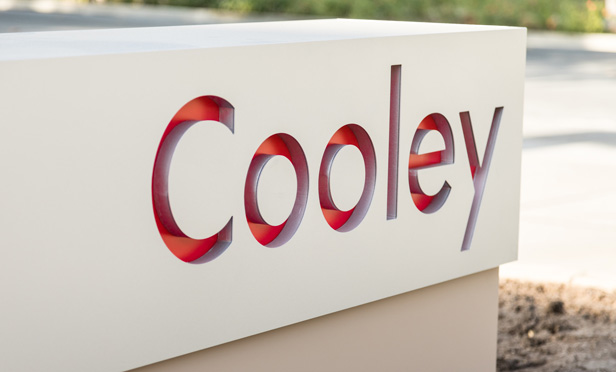Litigation Department of the Year, Privacy & Data Security: Cooley
This past year, litigators at Cooley won rulings knocking out two long-running cases accusing Facebook Inc. of illegally tracking users internet behavior—cases…
November 14, 2017 at 12:25 PM
5 minute read

This past year, litigators at Cooley won rulings knocking out two long-running cases accusing Facebook Inc. of illegally tracking users internet behavior—cases that carried potential statutory damages in the tens of billions of dollars, given the size of the social media giant's user base. The firm also squelched a right-of-publicity class action against Twitter Inc. that alleged the company provided access to user profiles without consent to an app-maker that allowed people to buy and trade Twitter profile information like trading cards. There the court accepted Cooley's argument that Twitter had immunity under section 230 of the Communications Decency Act.
Michael Rhodes and Matthew Brown, co-chairs of Cooley's privacy and data protection practice, recently answered questions from The Recorder about what keeps some of tech's leading brands coming back to the firm with their thorniest questions about user privacy.
What do each of these cases the firm is being recognized for demonstrate about the firm's privacy litigation capacities? They demonstrate our deep domain expertise in defending platforms (such as Twitter, Facebook, Google, Instagram, Snap) and our fluency with the underlying technologies of web and mobile based business models.
In the Twitter example, we successfully argued that CDA Section 230 immunized the company from claims involving user content that was allegedly improperly shared with a third-party app through the Twitter API. We were involved with CDA 230 cases early on, having handled the seminal case of Gentry v. eBay, 99 Cal.App.4th 816 (2002). Having used CDA 230 in varied ways over the past 15 years, we quickly identified how we could deploy it to defeat the right-of-publicity claims asserted against Twitter.
In one of the cases we handled for Facebook, much of the discovery, briefing and argument focused on whether any of the claimed personally identifiable information (PII) was actually ever seen by an advertiser (which was the core basis of the claim). This required a complex analysis of a large sampling of millions of referrer headers (browser metadata handed off by one web page to another as a user navigates the internet) to show that the class could not prove, on a common basis, whether alleged PII embedded in that metadata was ever actually “disclosed.”
Are there other significant victories in the past year that you would point to? When a feature of the Golden State Warriors mobile app was alleged to have violated the federal Wiretap Act, the defending NBA champions enlisted Michael Rhodes and Whitty Somvichian to do battle with plaintiffs firm and longtime Cooley adversary Edelson PC. Cooley also represents co-defendant Signal360, the technology company that innovated the feature. Cooley notched an early win for the Warriors when the Northern District of California's Judge White granted a motion to dismiss with leave to amend, finding the complaint failed to allege facts showing the Warriors “intercepted” any user communications. The second round of motions has been briefed and argued.
The Supreme Court's decision in Spokeo didn't quite have as major an impact on your practice as you initially thought it could have when the case was taken up by the high court. With that as the backdrop, where do you see this practice headed in the next two to five years? There is still a lot of action yet to be seen over the use, handling and protection of user information. Events like the massive Equifax data breach will lead to increased regulatory scrutiny and litigation over the nature of standing and injury in cases involving user information. Our notions of privacy and how our online identities and data should be handled remain in flux. So far, Spokeo has not been interpreted by the lower courts in a way that definitively shuts the door to these claims across the board.
With so few cases going to trial these days in any practice area, how do you make sure that new lawyers at Cooley get chances to build their skills, especially when it comes to oral advocacy and taking witness testimony? We are aware that it has become more challenging to get young lawyers chances to test their skills in court. So we have to proactively ensure those opportunities. For example, Max Bernstein, a junior SF litigation associate, recently argued part of the motion to dismiss in the Warriors' privacy class action in federal court. The court had encouraged the parties to let their younger colleagues present the argument and we jumped at the chance to give Max the opportunity.
How are your litigators harnessing technology to work more efficiently? Just as our clients expect that we have deep expertise and understanding of online platform, e-commerce, mobile, app and web technologies, we also use them in the delivery of our legal services. Communications are streamlined and often use message apps, document editing is centralized and often cloud-based, billing is electronic, and case files are available via private intranets.
This content has been archived. It is available through our partners, LexisNexis® and Bloomberg Law.
To view this content, please continue to their sites.
Not a Lexis Subscriber?
Subscribe Now
Not a Bloomberg Law Subscriber?
Subscribe Now
NOT FOR REPRINT
© 2025 ALM Global, LLC, All Rights Reserved. Request academic re-use from www.copyright.com. All other uses, submit a request to [email protected]. For more information visit Asset & Logo Licensing.
You Might Like
View All
US Patent Innovators Can Look to International Trade Commission Enforcement for Protection, IP Lawyers Say

Attorney of the Year Finalist: Michael Rubin, Latham & Watkins

John Hueston Appointed Monitor by CA Court Judge in Ruling on Veterans' Housing Case

Ex-Federal Prosecutor and White-Collar Defense Lawyer Joins Foundation Law Group
Trending Stories
- 1States Accuse Trump of Thwarting Court's Funding Restoration Order
- 2Microsoft Becomes Latest Tech Company to Face Claims of Stealing Marketing Commissions From Influencers
- 3Coral Gables Attorney Busted for Stalking Lawyer
- 4Trump's DOJ Delays Releasing Jan. 6 FBI Agents List Under Consent Order
- 5Securities Report Says That 2024 Settlements Passed a Total of $5.2B
Who Got The Work
J. Brugh Lower of Gibbons has entered an appearance for industrial equipment supplier Devco Corporation in a pending trademark infringement lawsuit. The suit, accusing the defendant of selling knock-off Graco products, was filed Dec. 18 in New Jersey District Court by Rivkin Radler on behalf of Graco Inc. and Graco Minnesota. The case, assigned to U.S. District Judge Zahid N. Quraishi, is 3:24-cv-11294, Graco Inc. et al v. Devco Corporation.
Who Got The Work
Rebecca Maller-Stein and Kent A. Yalowitz of Arnold & Porter Kaye Scholer have entered their appearances for Hanaco Venture Capital and its executives, Lior Prosor and David Frankel, in a pending securities lawsuit. The action, filed on Dec. 24 in New York Southern District Court by Zell, Aron & Co. on behalf of Goldeneye Advisors, accuses the defendants of negligently and fraudulently managing the plaintiff's $1 million investment. The case, assigned to U.S. District Judge Vernon S. Broderick, is 1:24-cv-09918, Goldeneye Advisors, LLC v. Hanaco Venture Capital, Ltd. et al.
Who Got The Work
Attorneys from A&O Shearman has stepped in as defense counsel for Toronto-Dominion Bank and other defendants in a pending securities class action. The suit, filed Dec. 11 in New York Southern District Court by Bleichmar Fonti & Auld, accuses the defendants of concealing the bank's 'pervasive' deficiencies in regards to its compliance with the Bank Secrecy Act and the quality of its anti-money laundering controls. The case, assigned to U.S. District Judge Arun Subramanian, is 1:24-cv-09445, Gonzalez v. The Toronto-Dominion Bank et al.
Who Got The Work
Crown Castle International, a Pennsylvania company providing shared communications infrastructure, has turned to Luke D. Wolf of Gordon Rees Scully Mansukhani to fend off a pending breach-of-contract lawsuit. The court action, filed Nov. 25 in Michigan Eastern District Court by Hooper Hathaway PC on behalf of The Town Residences LLC, accuses Crown Castle of failing to transfer approximately $30,000 in utility payments from T-Mobile in breach of a roof-top lease and assignment agreement. The case, assigned to U.S. District Judge Susan K. Declercq, is 2:24-cv-13131, The Town Residences LLC v. T-Mobile US, Inc. et al.
Who Got The Work
Wilfred P. Coronato and Daniel M. Schwartz of McCarter & English have stepped in as defense counsel to Electrolux Home Products Inc. in a pending product liability lawsuit. The court action, filed Nov. 26 in New York Eastern District Court by Poulos Lopiccolo PC and Nagel Rice LLP on behalf of David Stern, alleges that the defendant's refrigerators’ drawers and shelving repeatedly break and fall apart within months after purchase. The case, assigned to U.S. District Judge Joan M. Azrack, is 2:24-cv-08204, Stern v. Electrolux Home Products, Inc.
Featured Firms
Law Offices of Gary Martin Hays & Associates, P.C.
(470) 294-1674
Law Offices of Mark E. Salomone
(857) 444-6468
Smith & Hassler
(713) 739-1250






